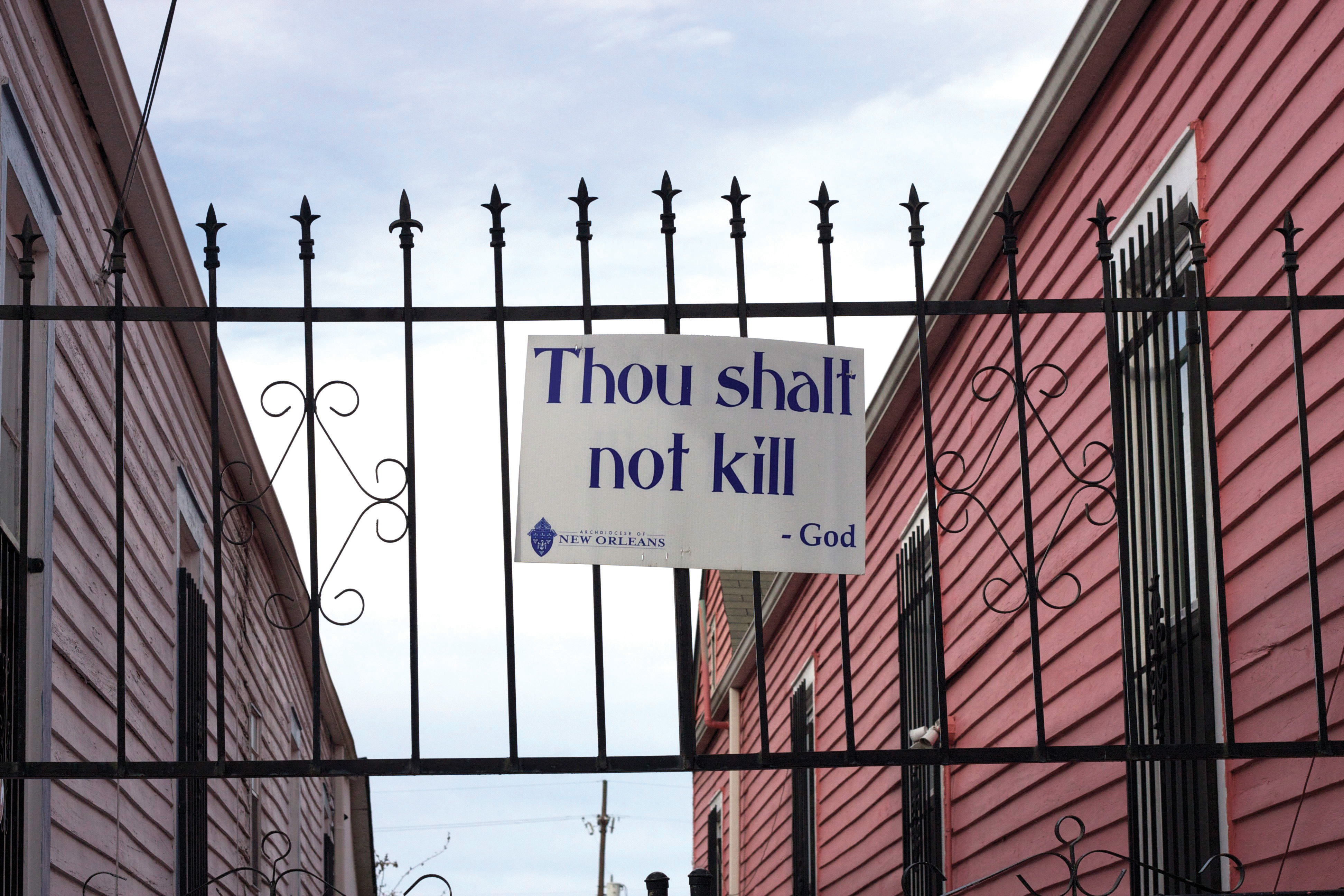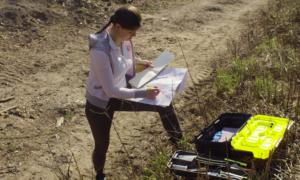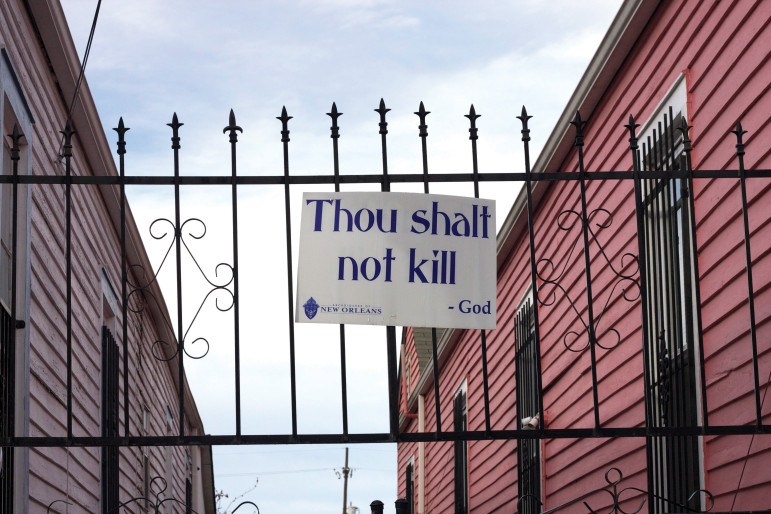
Kara Khan
This anti-violence sign can be found in front of homes in nearly every neighborhood in New Orleans.
NEW YORK — The two dozen teenagers who have met on the creaking second floor of Renaissance Center to watch a movie together one night in March are no strangers to their share of street violence. The Renaissance Center features a recording studio, replete with a drum set, a collection of electric and acoustic guitars, a row of microphones, and golden curtains for a backdrop. The teens come to perform songs they have written and composed about their life on the forlorn streets of the South Bronx, one of the poorest congressional districts in the country.
Once, some of the members of the center were recording a song about gun violence when a gunfight erupted across the street. But even these streetwise teens were about to be stunned, dumbfounded at what they were about to see projected on the wall of the Center on a wet, bone-cold winter night.
After sorting out some technical difficulties director John Richie, who had brought his movie “Shell Shocked,” as part of a tour of northeast cities, started the film. “Shell Shocked” is a documentary about gun violence and youth in America’s murder capital, New Orleans where, as one teenager interviewed in it says, it’s easier to get a gun than a textbook.
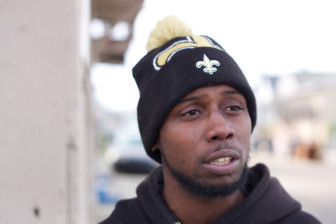
Kara Khan
Troy, 22, lives in the 7th Ward a high-crime neighborhood of New Orleans. “I love this city but I’m not ever going to move up because I’m surrounded by so much negativity.”
In one scene teenagers are carrying machine guns that look like something out of an action movie. They are AK-47s with banana clips, but in New Orleans the children call them “choppers” and one teenager says that by the time your are 21 you’ve had four or five “choppers.”
This scene, more than any other scene in “Shell Shocked,” a movie filled with death, violence and schoolroom chaos, disoriented the young Bronx audience. In New York, with stringent laws, a machine gun is something you only see in the movies, but in New Orleans it is classified as a hunting rifle and therefore fairly ubiquitous.
Many of the teens in the audience nod or grunt in affirmation at what they see transpire on the screen. When one New Orleans teenager pleads: “I really do not, do not want to die young! I do not want to stay here because I don’t want to die,” a sense of empathy registers on the young Bronx audience’s faces.
“I had to hold it in a little,” said one girl talking to Richie, 36, in a question-and-answer session after the screening. “But it was a big eye-opener. It made me grateful for what I have.”
Since the screening this past winter in the Bronx, Richie has gone to dozens of centers and organizations across New York, New Jersey and Connecticut.
“When it comes to the people who are going to benefit the most from stronger, more responsible gun legislation, and who would be spared the most from gun violence is African-American teens,” Richie said. “What I find most frustrating when we have these debates — whether guns are a public health issue or a self-defense issue — what rarely gets brought up is that by passing stronger regulations we’ll be saving the lives of these kids. I find it really frustrating that people don’t look at it like that.”
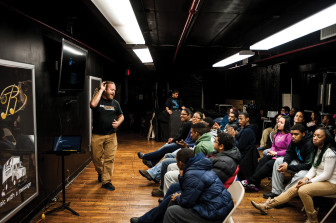
Kara Khan
The movie ‘Shell Shocked’ aired in the Bronx to a stunned audience who heard that in New Orleans it’s easier to get a gun than a textbook.
In Camden N.J., they continue to do screenings, he said, so that residents there can use it as a catalyst to talk about its gun violence problem with youth. He said some activists and residents in Trenton and Camden have asked him to come to their towns and do a movie about their problems. He said the movie has taken on a life of its own and that in some towns in California, people he’s never met are using it to spark discussions on ending gun violence.
Richie studied film at the University of New Orleans and is now working on a documentary about gun laws. In 2008 he was working with the Fountain of Youth organization to offer technical support with cameras for a film project about teens. After several weeks none of the teens had opened up. So Richie gave them all journals and asked them to write about a time they witnessed, experienced, or perpetrated an act of violence. Richie vividly remembers the sensation he had reading the teens’ entries, as if he had been living in a science-fiction parallel world to these kids.
“I was a bit shocked and a bit ashamed that I had been living in the city for eight years at that point and that almost every African-American kid I met was touched by gun violence,” he said. “They felt like it was fairly normal, because everyone else they knew thought it was normal, part of the city’s make-up. I needed to make sure we didn’t let that kind of violence be normal. If I wasn’t aware, that meant a lot of adults weren’t aware of it.”
It was that impulse to show the parallel universe of commonplace carnage that was happening in the predominantly black streets of New Orleans that led him to make “Shell Shocked.”
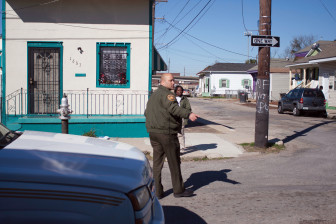
Kara Khan
A cop who lives in the neighborhood responds to a shooting in the 7th Ward, a high crime area of New Orleans.
“That’s one thing about this movie,” he said. “Everyone might not like it, but no one walks away from it being unmoved. A lot of people will say, ‘I’ve never seen it from that angle,’ and they want to help the kids. Kids will watch it and will appreciate that there’s a film out there that isn’t sugar-coating their lives, that’s telling their story and showing them how they live, and that someone does understand; that people out there are trying to help. A lot of people have trouble summing up the problem. “‘Shell Shocked’ is a good ice breaker; it starts the conversation. It doesn’t just expose the problem, it offers solutions.”
When the movie ended the lights flickered on and Richie introduced himself and asked the teens in the audience how many of them have been touched by violence. Nearly all of them raised their hands. Some were visibly shaken. Others wiped away tears. Richie asked them about how they felt about what they just saw, peering into the lives of teens simultaneously similar and alien to them.
Caroline Paguay understands the pain of her peers in New Orleans who lost friends to gun violence portrayed in the film. She had two friends gunned down, one 17, another who was 22. But Paguay remained stunned at what she saw in “Shell Shocked.”
“We always hear, oh, New York is so bad like that, and that we have so much to deal with, but I’ve never seen anything like that in New York — it’s, it’s shocking,” she said. “They have no hope,” she said. “That’s really disturbing to me. These kids can’t dream. They can’t aspire to anything, at the age of 9. That disturbs me.”
One question that came up again and again from the teens in the audience revealed the chasm between the political cultures of the two cities: Why doesn’t someone just pass a law to stop this?


